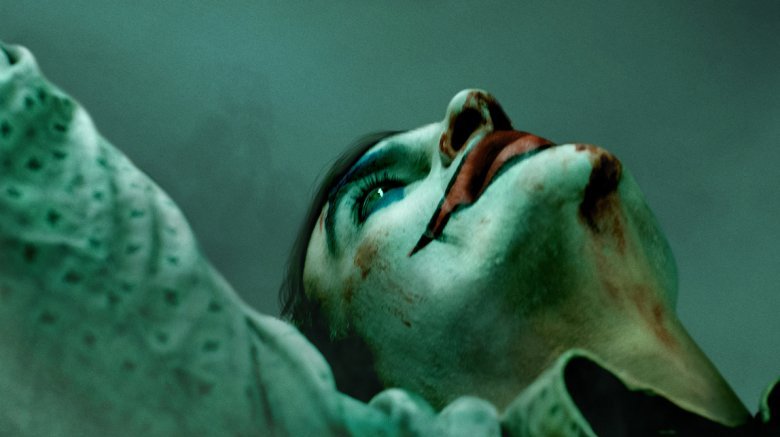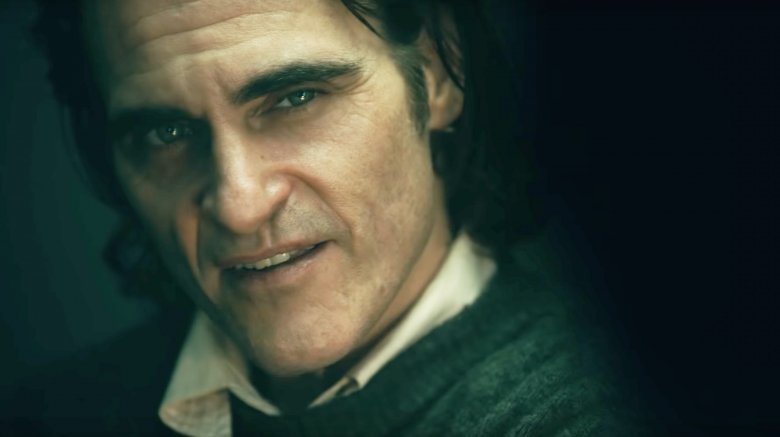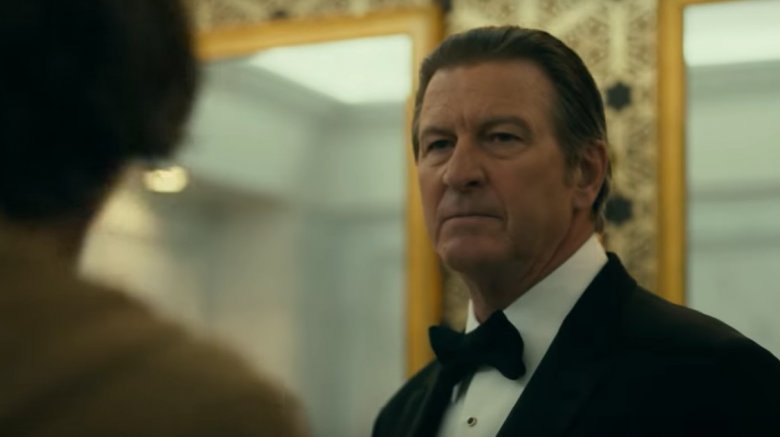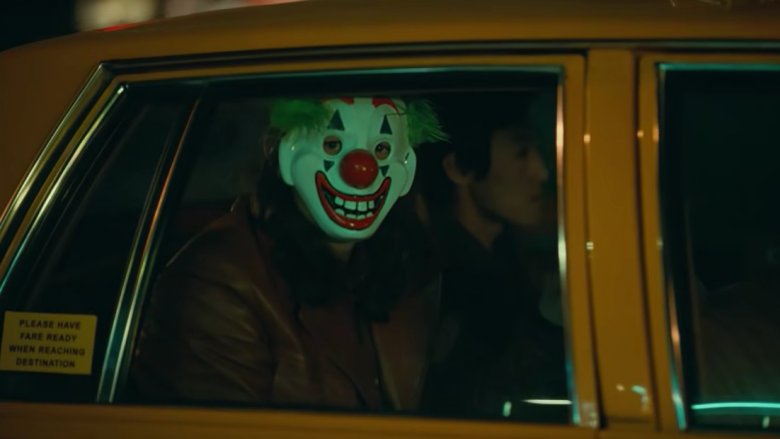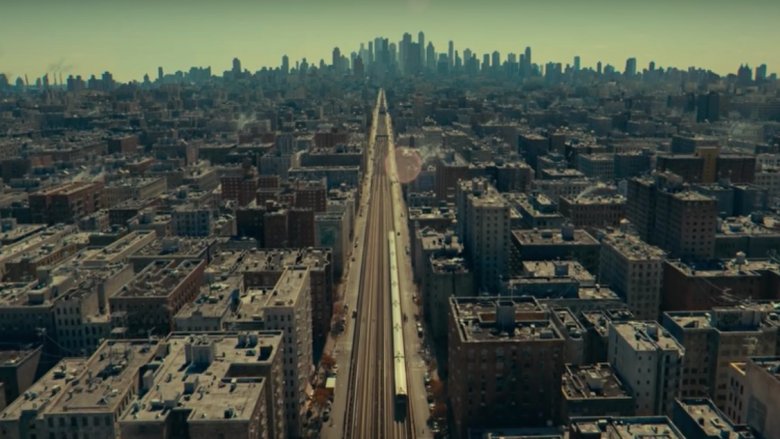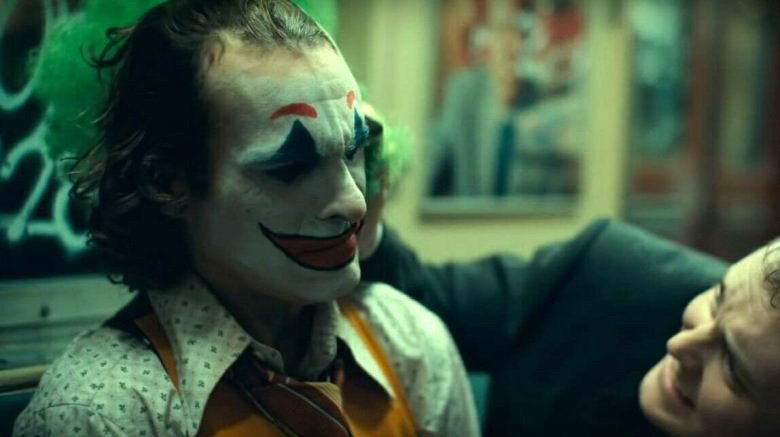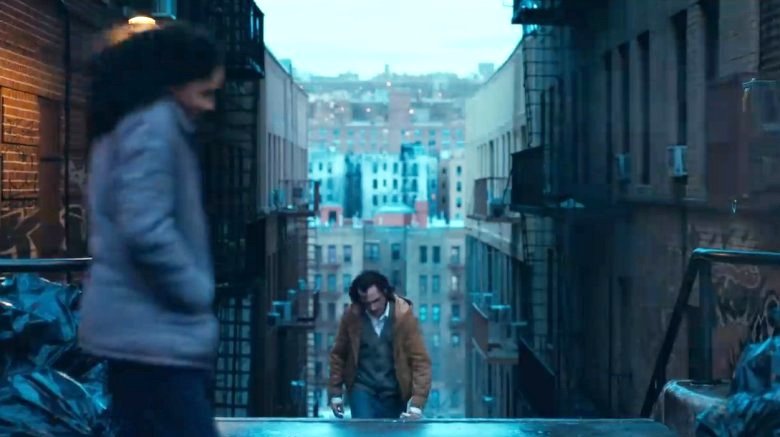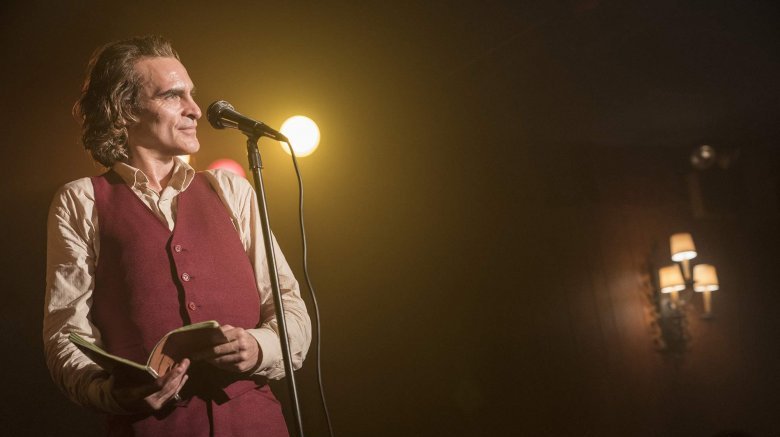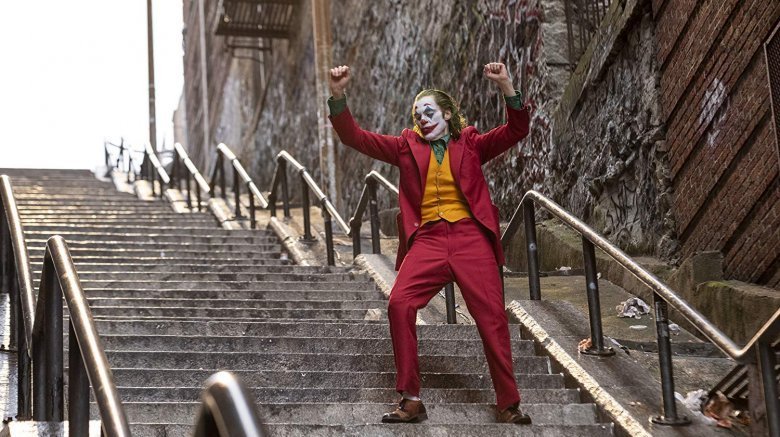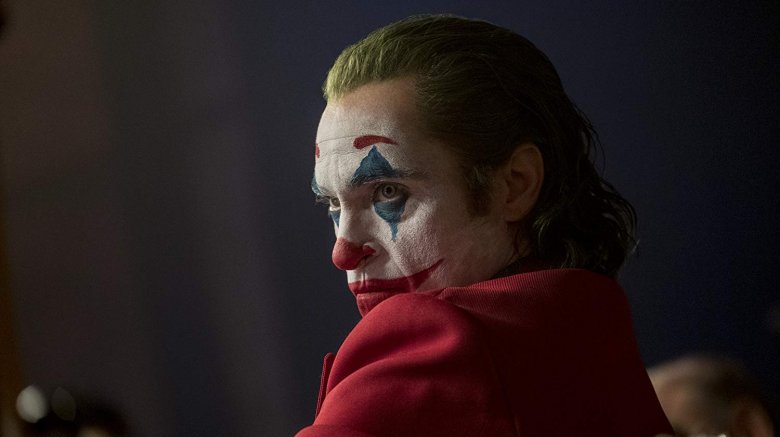What Joker Gets Right That Other Batman Movies Got Wrong
Comparing Joker to other Batman-related movies doesn't feel completely fair. If you were, for example, to say Joker is better than 1989's Batman because Joaquin Phoenix's Joker gives us a more accurate portrayal of mental illness than Jack Nicholson's, it would be akin to comparing a Metallica album and an Eminem album and judging the Metallica album superior because Kirk Hammett is a better guitarist than Eminem. In other words, of course Jack Nicholson's Joker doesn't give us an echo of mental illness that feels as real as Phoenix's — because that wasn't a priority in 1989's Batman, just as Eminem doesn't go into the studio worrying about guitar solos.
Joker is a character-driven drama about a mentally ill man that arguably could have been made without the setting of Gotham and all the familiar characters that go along with the Batman mythos. Joker isn't an action movie. There are no alien invasions to counter or city-wide prankster plots for a Dark Knight to foil. Still, that doesn't mean past and future filmmakers don't have lessons to learn from Joker.
Along with Joaquin Phoenix's brilliant, and at times equally heart-breaking and gut-wrenching, portrayal of man living with mental illness, the iconic setting of Gotham City is given a makeover in Joker that makes it more familiar to the real world, and in many ways more effective. Keep reading for our assessment of what Joker gets right that other Batman movies got wrong.
Joaquin Phoenix's Joker is the most relatable version of the character we've seen
Joaquin Phoenix's portrayal of Arthur Fleck is more relatable than any other Clown Prince we've met on the big screen. We all know what it's like to imagine romantic lives with those who don't reciprocate, to fantasize about being heralded in a world of fame, and to be recognized for being special. We don't, thankfully, all respond as Fleck does when those desires aren't fulfilled, but still, getting to know Arthur gives us something we've never had with any other Joker — an understanding of why he becomes and remains the Joker.
Cesar Romero's Joker of the '60s television show was, like the rest of that series' antagonists, just a crook with a particular theme. The origins of Heath Ledger's Joker are a mystery in The Dark Knight and his motivations seem to change from scene to scene. We get to meet Jack Napier before he becomes Joker in 1989's Batman, but it doesn't help make the character more relatable. Jack Napier is just as morally bankrupt and sadistic before his transformation as he is afterward — he just kills in much more creative ways later.
Obviously, Christopher Nolan and Tim Burton had different priorities when making their respective films than Todd Phillips did with Joker, but as MCU villains like Tom Hiddleston's Loki and Josh Brolin's Thanos have taught us, the more we can relate to a supervillain, the more we enjoy their portrayal.
The Waynes of Joker are much more flawed
We briefly meet some of the Wayne family in Joker. Thomas Wayne (Brett Cullen) is running for mayor, Arthur Fleck gets the opportunity to meet his future nemesis Bruce Wayne as a young boy, and we even briefly meet the butler Alfred Pennyworth (Douglas Hodge). Particularly in the case of Thomas Wayne, the versions we see of the characters in Joker aren't quite the saints Bruce Wayne usually remembers in the various movies.
Thomas Wayne is out of touch, condescending, and may or may not be ignoring his responsibility to a mentally ill and "illegitimate" son. He's dismissive and insulting to Arthur Fleck when confronted by him, and punches him in the face even though Fleck doesn't present any kind of physical threat. Even Alfred is a bit of a jerk in his dealings with Arthur, offering no sympathy or kindness to a man Alfred knows suffered abominably as a child.
Compared to previous portrayals, this is refreshing and feels genuine. For example, Linus Roache's version of Thomas Wayne in 2005's Batman Begins seems so beyond reproach, he's practically a cartoon character. He does nothing but selflessly give to Gotham, offer unassailable wisdom to his son, and even in his dying breaths worry about nothing beyond Bruce's well being. To be fair, it makes sense Bruce Wayne's memory of his father is viewed through rose-colored glasses, but seeing more depth and flaws to him makes him more than a faceless ghost fueling Batman's crusade.
Joker is the first Batman movie to give Joker's followers a reason to follow him
Joker always has his followers. Usually they're professional criminals, like in 1989's Batman and 2008's The Dark Knight. But in Joker, Arthur Fleck doesn't recruit anybody — at least not on purpose. After he kills three men on a subway, the news inspires the impoverished and powerless of Gotham to see him as a symbol of resistance. Gotham protesters regularly wear clown masks as a symbol of rebellion, and by the end of the film his followers rescue him from the police and worship him like a newborn god.
Joker is the first time we're given any believable reason for anyone to follow Joker. In Batman, The Dark Knight, and in most media it seems like one of Joker's favorite things to do is murder his own lackeys. It makes you wonder why anyone would ever even consider working for the guy. Not to mention it's tough to imagine professional criminals agreeing to work for a cackling, clown-faced maniac.
The clown-masked protesters of Gotham are not the henchmen of the other movies, which is exactly why it's more believable they would come to see Joker as their leader. They rightly feel betrayed and forgotten by Gotham, and Joker offers them an empowering alternative. It may not be the healthiest choice, but it makes more sense than hardened ex-cons saying, "sure, I'll dress like a mime for a guy who might murder me for a gag tomorrow."
The Gotham City of Joker feels more real than in other Batman movies
The Gotham City of Joker feels more like a city situated somewhere in the real world than any of its other big screen incarnations. The Gotham of 1989's Batman and its 1992 sequel Batman Returns was an imposing gothic nightmare. Joel Schumacher's version in 1995's Batman Forever and the 1997 hate-magnet Batman & Robin add some absurd Day-Glo to the city, making it seem that much more cartoonish.
Gotham — like its lighter reflection Metropolis — is really just New York City with a different name, and in Joker, it's never been more clear that that's exactly what it is. Christopher Nolan's trilogy gave us a Gotham closer to the real world than what we saw in the Burton/Schumacher films, but Joker gets it perfect by simply giving us New York City, and calling it Gotham instead.
The violence of Joker is brutal, and not stylized
Once Arthur Fleck turns to violence in Joker, it's a kind of violence that not only feels more genuine to the real world but for the Joker himself. Arthur Fleck's violence is brutal and without the Hollywood sheen of big-budget action flicks. It's non-stylized and viscerally jarring.
In comparison, the Joker of 1989's Batman kills in unbelievable, cartoonish ways. It's easy to laugh when he electrocutes a rival mob boss and poisons Gotham's population to make them die with gruesome forced grins just like his own, because none of it feels real. In some cases — like when he gasses an entire museum full of patrons and employees — we don't even know if he kills anyone or just knocks them out, and it hardly seems to matter.
Heath Ledger's Joker in 2008's The Dark Knight is certainly less cartoonish than Nicholson's depiction, but in many ways his violence doesn't feel right. While Ledger's performance is often intimate and chilling, the situations he's put in often feel more like a Michael Bay film than they should, like when he's firing at police cruisers with a missile launcher from the side of an 18-wheeler.
The Gotham City of Joker suffers from real world problems
Gotham City feels more real not just because of its architecture and lack of neon-painted gangs — 'because nothing says "stay off our turf" more than Day-Glo — but because the problems its citizens face are more real.
We're often told that Gotham CIty is a place besieged with ills, but we never really see them — at least not the ones that are familiar to us. We know they have to deal with things like cannibal crocodile men in the sewers, crazy vampire cultists, killer clowns, chemical attacks from parade float balloons, and fear gas that turns the entire city into a raging insane asylum, but the more genuine, down-to-earth ills facing any major metropolitan city are either invisible to us or they're eventually explained as the result of one of the Batman mythos' more fantastic elements — e.g. the poor of Gotham suffer not because of any social ills, but because of the centuries-old manipulations of the Court of Owls.
But the Gotham City of Joker is not, as far as we know, being manipulated by clandestine dark forces. It is a city facing social services cutbacks, a garbage strike, poverty, and crime. It's those very non-mysterious things that contribute to the creation of the Joker, and it explains exactly why — better than any other Batman film — the city could spawn as many monsters as the ones in Batman's rogues' gallery.
Joker's Arthur Fleck isn't funny, and he shouldn't be
One thing that's clear pretty early in Joker – even to Arthur Fleck's mother — is that Arthur isn't funny. Even at the end, when Fleck allows Joker to emerge, there's nothing funny about him. The knock-knock joke he tells Murray Franklin isn't funny even in a shocking, black humor manner. And in this way, Arthur Fleck is more like the Joker of the comics than just about any other incarnation.
it may seem counter-intuitive, but in the comics the Joker is hardly ever funny. He's funny to himself, sure, but that's about it. No one reads a Joker comic and laughs from cover to cover. it isn't his humor that makes him fascinating — it's the fact that he looks at the world so differently.
Jack Nicholson's Joker in Batman is genuinely hilarious and while he's more mesmerizing than funny, Heath Ledger's Clown Prince has some funny moments as well. But the Joker that emerges from Arthur Fleck is no more funny on stage than Fleck is. He's funny to himself and that's all the funny he needs.
The Clown Prince of Joker is no mastermind
One of the more refreshing aspects of Joaquin Phoenix's Joker is that Arthur Fleck is no mastermind. Arthur has plans, big plans, especially when he gets booked on Murray Franklin's show. But he's no criminal genius, and Joker never fools us into thinking he is. Arthur Fleck's transformation into the Joker is his surrender to his mental illness, and that illness rules his actions and doesn't care about the consequences. He almost gets arrested because he's busy dancing on the steps outside his apartment building. He's eventually committed to a mental institution.
The Jokers of other Batman films, in comparison, are such geniuses it can be tough to imagine that they suffer from mental illness at all. The Joker is never more dishonest in The Dark Knight than his speech to the hospitalized Harvey Dent in which he claims he doesn't "have plans" but is more akin to a dog chasing a car. Meanwhile, we've learned this car-chasing dog executed a plan beginning with the attempted assassination of the Gotham City mayor with the express purpose of getting Joker arrested so he could get access to the GCPD and kidnap the money launderer Lau.
Meanwhile, Arthur Fleck couldn't show up to a clown gig at a kid's hospital and keep his gun hidden. It makes Fleck seem much more honest, as well as more of a true "agent of chaos," as Ledger's Joker calls himself.
Arthur Fleck is a victim as much as he's a predator
We see more of the Clown Prince's origin story than ever in Joker. As a result we learn that, while it doesn't excuse his actions, Joker is as much a victim as he is a criminal. Fleck was horribly abused at an early age, including suffering a serious head injury. Early in the film he is abandoned by some of the only support he has when the Gotham City social services are cut and he no longer has access to therapy or medication.
It's reminiscent of the 2017-2018 DC Comics miniseries Batman: The White Knight, which reverses the roles of Batman and Joker. Among other things, the comic book suggests that for years Batman and Gotham City went straight to violence in dealing with Joker rather than attempting any genuine treatment of his mental illness. Unlike The White Knight, Todd Phillips' Joker is set long before Joker and Batman start circling one another, but like The White Knight, it's one of the only Batman-related stories to confront the notion that the Joker is a person with an illness who is not given access to what he needs to be healthy. You might argue movies like Batman and The Dark Knight would suffer if their hero were forced to deal with his villain in ways that didn't involve bat-a-rangs and martial arts, but it could also lead to a much more engaging story.
